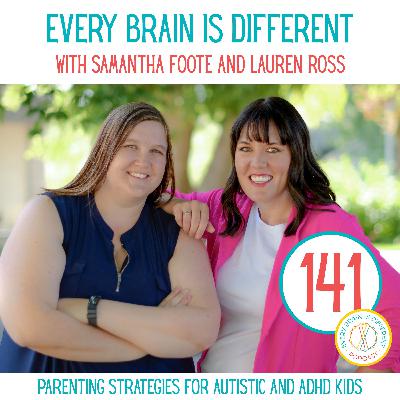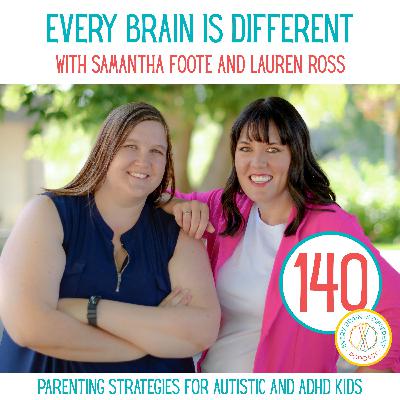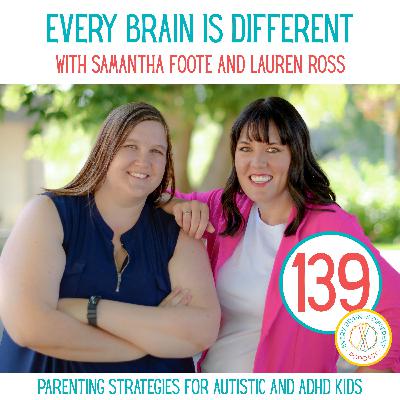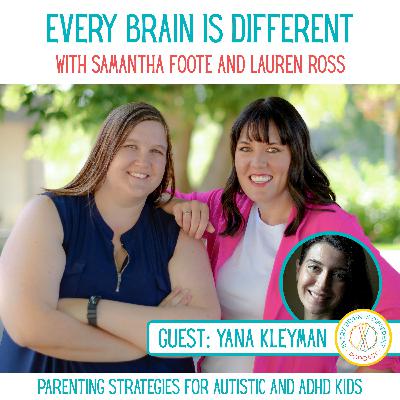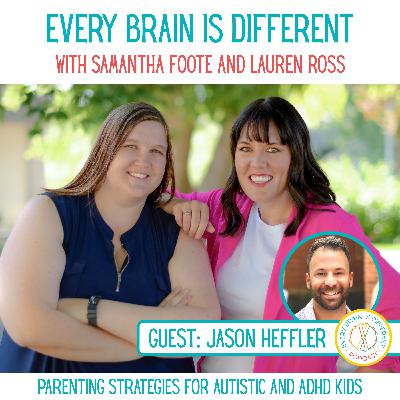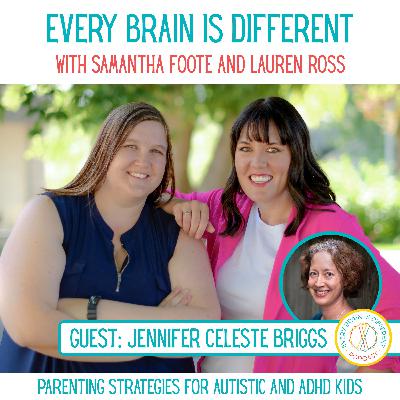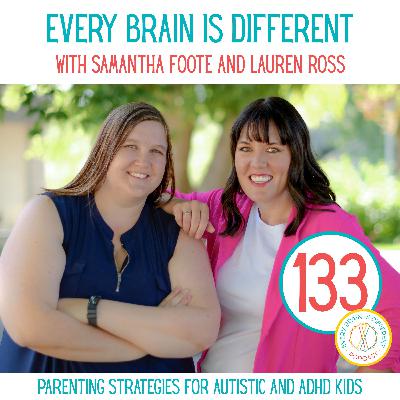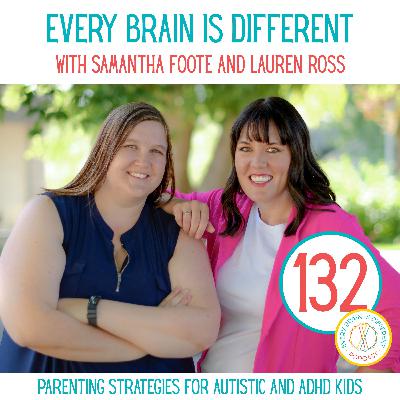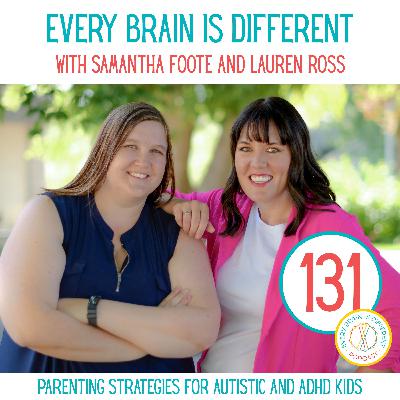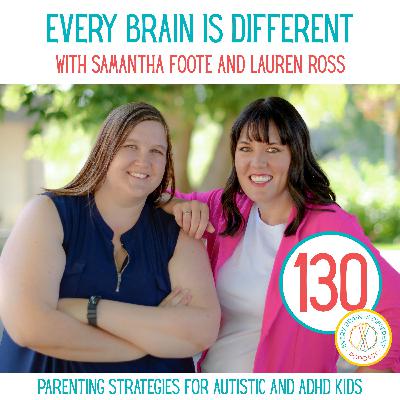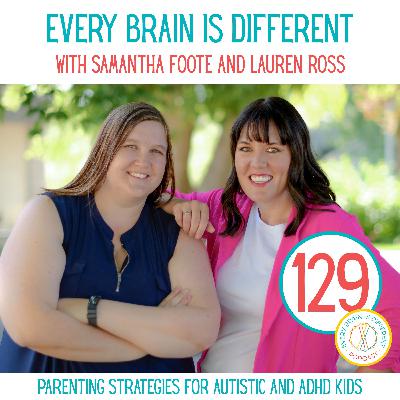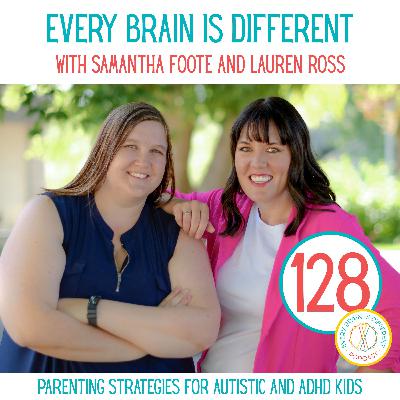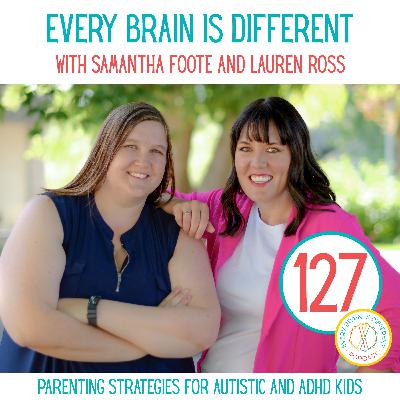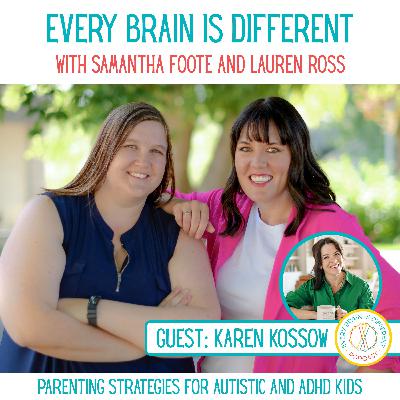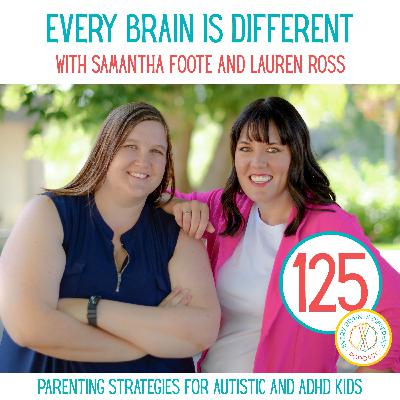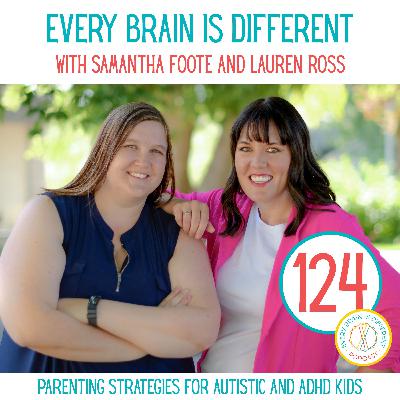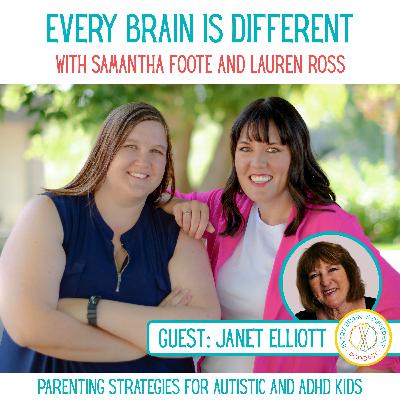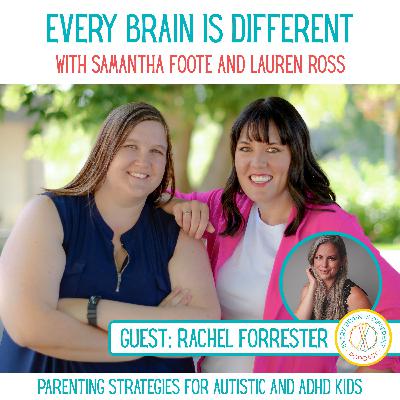Discover Autistic and ADHD Kids Parenting Strategies: Every Brain is Different
Autistic and ADHD Kids Parenting Strategies: Every Brain is Different

Autistic and ADHD Kids Parenting Strategies: Every Brain is Different
Author: Samantha Foote, Lauren Ross
Subscribed: 35Played: 473Subscribe
Share
© 2022
Description
Welcome to Every Brain is Different, the podcast designed for parents raising kids with Autism, ADHD, and other neurodiverse conditions. Discover practical parenting strategies, expert insights, and real-life stories that highlight the strengths and challenges of neurodivergent individuals. Join us to connect with a supportive community of parents, gain tools to help your child thrive, and celebrate the unique ways every brain works. If you're looking for inspiration, effective parenting strategies, or simply a sense of connection, tune into Every Brain is Different and join a community that truly understands.
Website: www.everybrainisdifferent.com
Instagram: www.instagram.com/everybrainisdifferent
TikTok: www.tiktok.com/everybrainsidifferent
YouTube: www.youtube.com/@everybrainisdifferent
Website: www.everybrainisdifferent.com
Instagram: www.instagram.com/everybrainisdifferent
TikTok: www.tiktok.com/everybrainsidifferent
YouTube: www.youtube.com/@everybrainisdifferent
180 Episodes
Reverse
In this episode, Samantha and Lauren discuss autistic burnout, especially prevalent during the holiday season. They explain the difference between stress and burnout, and share personal experiences to illustrate the impact of prolonged masking and sensory overload on neurodivergent children.Samantha and Lauren provide detailed signs of burnout, including increased irritability, emotional outbursts, and physical symptoms, along with practical advice on how to support recovery through reduced demands, predictability, sensory rest, and encouraging autonomy.They emphasize the importance of parental regulation and offer strategies to prevent future burnout, such as prioritizing recovery time, practicing energy accounting, and teaching children to advocate for their needs. 00:00 Introduction00:39 Discussing Autistic Burnout During the Holidays02:58 Understanding Autistic Burnout09:22 Early Warning Signs of Burnout12:10 Common Triggers of Burnout14:59 Supporting Recovery from Burnout20:48 Preventing Future Burnout24:28 Conclusion and Community Support Join the Neurodivergent Parenting Community: https://www.everybrainisdifferent.com/membership
Connect with Samantha Foote!Website: https://everybrainisdifferent.com/Instagram: https://www.instagram.com/everybrainisdifferentYouTube: https://www.youtube.com/@everybrainisdifferent
In this episode, Samantha and Lauren dive talk about of gratitude. They share personal anecdotes and practical strategies for incorporating gratitude into daily life, especially for parents of neurodivergent children.The discussion covers how gratitude can serve as a tool for self-regulation, helping both parents and kids navigate challenging moments by shifting focus from problems to solutions.Additionally, they explore various sensory and creative methods to make gratitude a concrete and engaging practice for children, thereby fostering emotional well-being and resilience. 00:00 Introduction to Every Brain Is Different Podcast00:43 Today's Topic: The Power of Gratitude01:44 Real-Life Example: Halloween Gratitude Story04:21 The Science Behind Gratitude06:14 Practical Gratitude Tips for Parents13:20 Modeling Gratitude for Kids15:17 Sensory and Creative Gratitude Activities21:22 Conclusion and Support Resources Join the Neurodivergent Parenting Community: https://www.everybrainisdifferent.com/membership
Connect with Samantha Foote!Website: https://everybrainisdifferent.com/Instagram: https://www.instagram.com/everybrainisdifferentYouTube: https://www.youtube.com/@everybrainisdifferent
In this episode, Samantha and Lauren talk about the significant role that play has in children's development. They discuss how play is not only about having fun, but it actually changes brain structure and function, aiding in the learning process. They explain that play releases dopamine, helping with motivation, focus, and learning, especially for children with ADHD.Samantha and Lauren highlight the importance of engaging in play to teach social skills, problem-solving, emotional regulation, and cognitive flexibility. They also share personal anecdotes and professional experiences to emphasize the profound impact play has on building trust and connection with children. 00:00 Introduction00:39 The Importance of Play for Adults and Kids02:36 Neuroscience Behind Play04:49 Play and Emotional Regulation06:09 Building Trust and Perspective Through Play10:11 Connecting with Kids Through Play15:35 Effective Therapy Through Play20:15 Practical Tips for Incorporating Play22:49 Conclusion and Final Thoughts Join the Neurodivergent Parenting Community: https://www.everybrainisdifferent.com/membership
Connect with Samantha Foote!Website: https://everybrainisdifferent.com/Instagram: https://www.instagram.com/everybrainisdifferentYouTube: https://www.youtube.com/@everybrainisdifferent
In this episode, Samantha and Lauren interview Yana Kleyman, a functional medicine health consultant. Yana shares her personal journey from traditional healthcare as a pharmacist to discovering the transformative power of functional medicine.This transition was inspired by her own health crisis at age 33, which led her to explore root cause medicine. Today, Yana is dedicated to helping children with ADHD and other developmental disorders thrive naturally by challenging predetermined futures.Yana and the hosts discuss various approaches to functional medicine, emphasizing the importance of addressing root causes like gut health, genetics, and environmental factors rather than just treating symptoms with medication. 00:00 Introduction00:41 Meet Our Special Guest: Janna Klayman02:08 Yana's Personal Health Journey03:25 Understanding Functional Medicine05:27 The Role of Nutrition and Lifestyle14:35 Practical Tips for Parents20:36 Resources and Final Thoughts26:36 Conclusion and Highlights Join the Neurodivergent Parenting Community: https://www.everybrainisdifferent.com/membership Connect with Yana: Instagram: https://www.instagram.com/atypically.awesomeFacebook: https://www.facebook.com/profile.php?id=61558184355910YouTube: https://www.youtube.com/@DrYanaKleymanLinkedIn: https://www.linkedin.com/in/yana-kleyman-45a76a313/
Connect with Samantha Foote!Website: https://everybrainisdifferent.com/Instagram: https://www.instagram.com/everybrainisdifferentYouTube: https://www.youtube.com/@everybrainisdifferent
In this episode, Samantha and Lauren discuss the positive impacts of spending time in nature on mental health. They explore how outdoor activities activate the parasympathetic nervous system, decreasing cortisol levels, lowering heart rates, and improving sensory integration and attention.Using personal anecdotes and scientific explanations, Samantha and Lauren highlight nature's ability to provide a gentle and predictable sensory input conducive to emotional and cognitive rejuvenation. They also discuss practical strategies for encouraging neurodivergent children to spend more time outdoors, emphasizing the importance of making such activities a part of daily routines. 00:00 Introduction00:52 Today's Topic: Touching Grass for Mental Health01:43 Personal Stories and Benefits of Nature04:59 The Neuroscience Behind Nature's Benefits15:37 Practical Outdoor Activities for Kids18:40 Overcoming Barriers to Outdoor Time19:52 Seasonal Outdoor Activities22:04 Conclusion and Final Thoughts Join the Community: https://www.everybrainisdifferent.com/podcastScavenger Hunt Cards: https://amzn.to/42Ul4hT
Connect with Samantha Foote!Website: https://everybrainisdifferent.com/Instagram: https://www.instagram.com/everybrainisdifferentYouTube: https://www.youtube.com/@everybrainisdifferent
In this episode, Samantha and Lauren talk about Halloween and the sensory challenges that can come with it. They discuss the sensory overload issues related to costumes, decorations, loud noises, and changes in routine.To help parents navigate these challenges, they offer practical advice on practicing with costumes, managing trick-or-treating expectations, and choosing sensory-friendly environments.They also emphasize the importance of understanding that children's behavior is a form of communication and suggest strategies to support children before, during, and after Halloween events to prevent sensory overload and ensure a positive experience for both parents and their kids. 00:00 Introduction01:28 Homeschooling Decision and Mom Burnout04:51 Halloween Sensory Overwhelm11:57 Preparing for Halloween Night16:56 Managing Halloween Night18:12 Post-Halloween Tips and Reflection20:02 Conclusion and Resources Join the Neurodivergent Parenting Community: The Neurodivergent Parenting Community | Every Brain is DifferentHarkla: Harkla - Special Needs Products for Happier and Healthier Families
Connect with Samantha Foote!Website: https://everybrainisdifferent.com/Instagram: https://www.instagram.com/everybrainisdifferentYouTube: https://www.youtube.com/@everybrainisdifferent
In this episode, Samantha and Lauren welcome Jason Heffler, author of 'Tongue Tied'. Jason shares his personal journey of growing up with a stutter and the challenges he faced, including bullying. His book is designed to help children with speech disorders gain confidence and understand that their speech does not define them.Jason discusses the importance of representation in literature and offers valuable tips for parents to support their children, like praising the effort rather than fluency and teaching empathy and resilience.The discussion touches on the power of acknowledgment, as Jason highlights how owning his stutter changed his life and career prospects.He elaborates on cognitive reframing strategies and the use of music as a therapeutic tool, sharing his own experiences as a DJ and writer in the music industry. 00:00 Intro00:41 Meet Jason Heffler: Author and Advocate01:27 Jason's Journey with Stuttering02:48 The Inspiration Behind 'Tongue Tied'04:00 Supporting Children with Speech Impediments09:58 The Power of Music in Overcoming Stuttering12:53 Advice for Parents on Bullying and Empathy15:18 Acknowledging and Embracing Neurodiversity19:35 Resources and Final Thoughts Connect with Samantha: https://www.everybrainisdifferent.comGet the Book: https://amzn.to/478a2H8Connect with Jason: https://rebrand.ly/tonguetied
Connect with Samantha Foote!Website: https://everybrainisdifferent.com/Instagram: https://www.instagram.com/everybrainisdifferentYouTube: https://www.youtube.com/@everybrainisdifferent
In this episode, Samantha and Lauren interview Jennifer Celeste Briggs, a mother who shares her transformative experience with the Sunrise program. Jennifer talks about how the program, which she tailored for her daughter, significantly improved her language and social skills.We explore the importance of meeting children where they are, the collaborative effort between parents and professionals, and the impact of patient and targeted interaction on neurodivergent children.Jennifer also talks about her book, "Watching Sarah Rise," which documents their journey and offers recommendations for other parents navigating similar paths. 00:00 Introduction00:39 Meet Jennifer Celeste Briggs!02:18 The Sunrise Program03:50 Therapy Approaches and Parenting Insights05:27 Challenges and Successes in Therapy10:08 Collaborating with Professionals and Schools21:37 Jennifer's Book and Resources for Parents24:46 Conclusion and Final Thoughts Harkla: https://harkla.co/?rfsn=8804907.29f26d5Get the Book here! https://amzn.to/42SAUt7 Connect with Jennifer:Website: https://www.watchingsarahrise.com/Facebook: https://www.facebook.com/jennifercelestebriggsauthorInstagram: https://www.instagram.com/jennifercelestebriggsauthor/ Other Resources:Autism Treatment Center of America: https://autismtreatmentcenter.org/Autism Optimism International: https://www.autismoptimisminternational.com/Autistic Logistics Book: https://amzn.to/4gPNBeb
Connect with Samantha Foote!Website: https://everybrainisdifferent.com/Instagram: https://www.instagram.com/everybrainisdifferentYouTube: https://www.youtube.com/@everybrainisdifferent
In this episode, Samantha and Lauren discuss the conclusion of their conversation on managing mom's mental load.They provide five practical strategies to help moms regulate stress and manage interruptions, including the one-minute reset, setting interruption boundaries, sensory swaps, a decision diet, and maintaining a daily white space block.Additionally, they discuss the importance of co-regulation and self-care, emphasizing that a well-supported mom is a better-regulated mom, which benefits the entire family. 00:00 Introduction to Every Brain Is Different Podcast00:47 Addressing Autism Causes and Concerns01:37 Mom's Mental Load: Recap and New Strategies02:25 Micro Regulation Techniques04:18 Interruption Boundaries06:20 Sensory Swap and Decision Diet09:31 Daily White Space Block15:47 Weekly Routine and Family Meetings22:13 Homework and Final Thoughts Join the Neurodivergent Parenting Community: https://www.everybrainisdifferent.com/membership
Connect with Samantha Foote!Website: https://everybrainisdifferent.com/Instagram: https://www.instagram.com/everybrainisdifferentYouTube: https://www.youtube.com/@everybrainisdifferent
In this episode, Samantha and Lauren continue their discussion on managing the mental load experienced by moms. They address the difficulties of delegating household responsibilities and provide practical steps to shift tasks to family members or others to alleviate stress.Samantha and Lauren emphasize the importance of accepting different methods of task completion, trusting the process, and providing clear instructions and ownership of tasks.They also offer valuable advice on involving children in household responsibilities in age-appropriate ways, all aimed at reducing burnout and creating a more balanced family dynamic. 00:00 Introduction00:43 Continuing the Conversation on Mental Load00:59 Shifting Responsibilities to Reduce Mental Load01:24 Overcoming Blocks in Delegation04:42 Steps to Effective Delegation16:35 Involving Kids in Household Responsibilities23:27 Scripts for Effective Communication Join the Community: https://www.everybrainisdifferent.com/membership
Connect with Samantha Foote!Website: https://everybrainisdifferent.com/Instagram: https://www.instagram.com/everybrainisdifferentYouTube: https://www.youtube.com/@everybrainisdifferent
In this episode, Samantha and Lauren discuss the mental load carried by moms, marking the beginning of a three-week series on the topic. They explore the often-overwhelming responsibilities that mothers juggle daily, from managing household chores to coordinating children's schedules.Samantha and Lauren emphasize the significance of self-care and provide practical advice on managing sensory input, making micro-decisions, and employing positive self-talk methods to alleviate stress and prevent burnout.A structured approach for recognizing and managing different stages of overwhelm is introduced. 00:00 Introduction to Every Brain Is Different Podcast00:43 The Mental Load of Moms01:51 Strategies for Offloading Responsibilities03:44 Understanding the Mental Load of Motherhood08:05 Stages of Overwhelm: Whisper, Talk, Shout13:32 Practical Tips for Managing Overwhelm14:49 Parenting Power Hour Invitation23:52 Daily Check-ins and Reset Strategies27:40 Recommended Self-Care App: Finch29:05 Conclusion and Support Resources Finch App: https://finchcare.com/ Join the Neurodivergent Parenting Community: https://www.everybrainisdifferent.com/membership
Connect with Samantha Foote!Website: https://everybrainisdifferent.com/Instagram: https://www.instagram.com/everybrainisdifferentYouTube: https://www.youtube.com/@everybrainisdifferent
In this episode, Samantha and Lauren talk about Avoidant Restrictive Food Intake Disorder (ARFID). They explain that ARFID is a recognized eating disorder, different from simple picky eating, characterized by extreme avoidance or restriction of food, leading to nutritional, growth, or emotional problems.The disorder is often misunderstood, with myths such as it being due to bad parenting or something children will grow out of.Samantha and Lauren discuss sensory sensitivities, negative food experiences, interoception challenges, and anxiety as key factors contributing to ARFID, particularly in children with autism and ADHD.They also share their personal experiences and emphasize the importance of patience, understanding, and professional help in managing ARFID.00:00 Introduction to the Podcast00:52 Understanding ARFID: Avoidant Restrictive Food Intake Disorder03:50 Common Signs and Symptoms of ARFID05:01 Challenges and Myths Surrounding ARFID05:46 Causes and Triggers of ARFID12:39 Impact on Family Dynamics17:35 Support and Professional Help18:40 Final Thoughts and Takeaways Join the Neurodivergent Parenting Community: https://www.everybrainisdifferent.com/membershipHarkla Link: https://harkla.co/?rfsn=8804907.29f26d5
Connect with Samantha Foote!Website: https://everybrainisdifferent.com/Instagram: https://www.instagram.com/everybrainisdifferentYouTube: https://www.youtube.com/@everybrainisdifferent
In this episode, Samantha and Lauren discuss the challenges and methods of handling food aversions in autistic children.They share personal experiences and emphasize that forcing children to eat can be counterproductive. Instead, they recommend engaging the help of a feeding therapist and employing assent-based strategies.Steps include gradually introducing the disliked food by first placing it nearby, then on the plate, and finally encouraging the child to touch, smell, and play with the food before tasting it.Samantha and Lauren stress the importance of patience and allowing children to progress at their own pace, while also highlighting the benefits of involving children in meal preparation and planning. 00:40 Feeding Therapy for Neurodivergent Kids01:12 Personal Stories and Challenges with Food Aversions04:35 Steps to Help Kids Try New Foods05:43 The Importance of Feeding Therapy and Exposure Therapy14:22 Final Tips and Encouragement19:39 Conclusion and Upcoming Episodes Join the Neurodivergent Parenting Community: The Neurodivergent Parenting Community | Every Brain is DifferentHarkla Link: Harkla - Special Needs Products for Happier and Healthier Families
Connect with Samantha Foote!Website: https://everybrainisdifferent.com/Instagram: https://www.instagram.com/everybrainisdifferentYouTube: https://www.youtube.com/@everybrainisdifferent
In this episode, Samantha and Lauren talk about the challenges and changes families face when children transition back to school.They provide practical advice on managing children's after-school meltdowns and emphasize the importance of establishing coping skills, ensuring children are well-fed and hydrated, and maintaining a consistent routine to help children adjust.They also discuss the benefits of positive reinforcement and the effectiveness of switching caregivers to avoid power struggles, showcasing various strategies to create a supportive environment for neurodivergent kids. 00:51 Back to School Transitions02:58 Understanding Meltdowns and Masking05:24 Coping Skills and Sensory Processing07:34 Practical Tips for Parents17:53 Positive Reinforcement Strategies20:28 Handling Power Struggles21:48 Parent Communication23:25 Conclusion and Wrap-Up Join the Neurodivergent Parenting Community: https://www.everybrainisdifferent.com/membership
Connect with Samantha Foote!Website: https://everybrainisdifferent.com/Instagram: https://www.instagram.com/everybrainisdifferentYouTube: https://www.youtube.com/@everybrainisdifferent
In this episode Samantha and Lauren share practical advice for a smoother transition back to school. They discuss the excitement and challenges of children starting school, emphasizing the importance of planning and coping strategies.Samantha and Lauren share tips such as creating a balanced schedule, managing anxiety, building excitement about school, and practicing practical skills like eating lunch within a limited time. They also highlight the significance of attending school events and ensuring kids can handle their supplies independently. 00:00 Introduction to the Podcast00:39 Back to School Excitement and Challenges04:13 Managing Summer Activities and Nervous Systems07:02 Preparing Kids for School: Practical Tips14:21 Lunch Preparation and School Events21:29 Final Thoughts and Encouragement Join the Neurodivergent Parenting Community: https://www.everybrainisdifferent.com/membership
Connect with Samantha Foote!Website: https://everybrainisdifferent.com/Instagram: https://www.instagram.com/everybrainisdifferentYouTube: https://www.youtube.com/@everybrainisdifferent
In this episode, we welcome back Karen Kassow, a writer, certified master life coach, and founder of AI-Powered Homeschool.As a neurodivergent parent raising two autistic children, Karen shares her journey and dedicated advocacy within the neurodivergent community.She discusses the challenges faced by families in navigating special education services, especially with the potential removal of crucial programs like the family-paid caregiving waiver. Karen emphasizes the importance of making educated voting choices to support these programs and shares the heartbreaking stories of families that rely on them.Karen talks about homeschooling as a viable, flexible alternative for neurodivergent families, offering various strategies and resources that cater to the unique needs of these children.Listeners are encouraged to get involved in local disability resources and make their voices heard to enact change and support for families in similar situations. 00:00 Introduction to the Podcast00:40 Meet Karen Caso: Life Coach and Advocate01:57 Challenges in the Neurodivergent Community02:29 The Importance of Educated Voting09:31 Homeschooling for Neurodivergent Kids16:18 Flexibility and Support in Homeschooling19:34 Homeschooling Standards and Regulations20:59 Idaho Homeschooling Regulations21:47 Standardized Testing Concerns24:43 Personal Homeschooling Experiences26:09 Flexibility in Homeschooling28:37 Challenges in Public Schooling32:00 Homeschooling Resources and Support35:16 Final Thoughts and Reflections Connect with Karen: Website: https://www.karenkossow.com/Join the Neurodivergent Parenting Community: https://www.everybrainisdifferent.com/membership
Connect with Samantha Foote!Website: https://everybrainisdifferent.com/Instagram: https://www.instagram.com/everybrainisdifferentYouTube: https://www.youtube.com/@everybrainisdifferent
In this episode, Samantha and Lauren discuss summer burnout experienced by both parents and neurodivergent children.They share personal stories and offer practical tips for recognizing signs of burnout, such as emotional dysregulation and behavioral changes.Samantha and Lauren emphasize the importance of creating a balanced routine that includes adequate downtime and sensory-friendly spaces to help children self-regulate and recover from overstimulation.They also discuss their own experiences and strategies for managing burnout and encourage listeners to share their own tips for overcoming burnout. 00:00 Introduction to Summer Burnout00:38 Personal Experiences with Burnout02:09 Recognizing Burnout Symptoms06:11 Managing Burnout in Kids09:01 Self-Regulation Strategies10:29 Host's Personal Burnout10:58 Conclusion and Next Episode Preview Follow us on Instagram: www.instagram.com/everybrainisdifferent
Connect with Samantha Foote!Website: https://everybrainisdifferent.com/Instagram: https://www.instagram.com/everybrainisdifferentYouTube: https://www.youtube.com/@everybrainisdifferent
In this episode, Samantha shares practical tips for implementing language shifts and going from telling kids what not to do using "don't" to telling what to do.She emphasizes redirecting behavior with clear and positive alternatives, keeping instructions simple and specific, and being consistent in using positive language. 00:00 Introduction to Positive Language00:55 Understanding the Impact of Negative Language01:15 Shifting to Positive Instructions02:10 Practical Examples and Tips03:32 Consistency and Final Thoughts04:17 Upcoming Events and Sign-Off Parenting Power Hour: 2nd Thursday of the month from 12:45-1:45 PM MDT. Sign up at www.everybrainisdifferent.com
Connect with Samantha Foote!Website: https://everybrainisdifferent.com/Instagram: https://www.instagram.com/everybrainisdifferentYouTube: https://www.youtube.com/@everybrainisdifferent
In this episode Samantha and Lauren speak with Janet Elliot, author of 'The Alien Savant,' a poignant exploration of her autistic brother's journey through a neurotypical world.Janet recounts the challenges faced by her family in the 1960s and 1970s, highlighting the lack of understanding and resources for children with developmental disabilities during that time.She discusses the evolution of special education and family advocacy, emphasizing the importance of recognizing strengths and fighting for appropriate educational and social services for neurodivergent individuals.The conversation also touches on the ongoing need for societal acceptance and support for adults with disabilities, along with practical advice and valuable resources for parents and caregivers. 00:00 Introduction to the Podcast and Guest00:43 Janet's Involvement in the Neurodivergent Community01:23 Challenges and Advocacy in the 1960s and 1970s05:08 Michael's Education Journey08:31 Michael's Adult Life and Continued Advocacy12:30 Advice for Parents of Neurodivergent Children14:40 Resources for Adults with Disabilities18:57 Janet's Book and Where to Find It21:31 Conclusion and Final Thoughts Connect with Janet:Website: https://www.myguidedpen.com/Buy the Book, The Alien Savant: https://www.bookshop.org/Connect with Sweet Zola's: https://sweetzolascandy.com/
Connect with Samantha Foote!Website: https://everybrainisdifferent.com/Instagram: https://www.instagram.com/everybrainisdifferentYouTube: https://www.youtube.com/@everybrainisdifferent
In this episode, Rachel Forrester, an Idaho real estate broker and founder of the support group Idaho Autism Moms, shares her expertise in assisting families with special needs children in finding suitable homes in and around Boise, Idaho.She discusses various considerations when buying a house, such as proximity to therapy services, neighborhood safety, and the importance of functional spaces like sensory rooms.Rachel also addresses the challenges of moving with special needs children and offers strategies to make the process as smooth as possible, including the usefulness of video walkthroughs and conducting thorough neighborhood research. 00:00 Introduction and Guest Welcome00:18 Rachel's Involvement in the Neurodivergent Community01:11 Housing Needs for Families with Special Needs02:30 Considerations for Home Features and Safety07:25 Importance of Proximity to Resources13:05 Navigating Neighborhood Safety and Community19:21 Rachel's Free Guide and Final Thoughts21:00 Conclusion and Highlights Parenting Power Hour: www.everybrainisdifferent.com Get Rachel's Guide:tinyurl.com/rachelinboise Connect with Rachel:Instagram: https://www.instagram.com/the.208.rachel?igsh=MXA1Z2t4YWtxanQxaQ
Connect with Samantha Foote!Website: https://everybrainisdifferent.com/Instagram: https://www.instagram.com/everybrainisdifferentYouTube: https://www.youtube.com/@everybrainisdifferent


